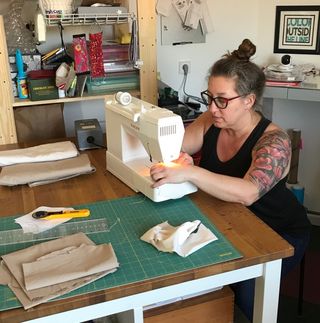Coronavirus Disease 2019
One Action to Help You Feel Instantly Better During COVID-19
Do something for someone else.
Posted May 5, 2020 Reviewed by Ekua Hagan

Part of the stress of COVID-19 is the complete loss of control over our own lives. We don’t know when we will be able to get back to work, travel to see our families, or even get a professional haircut again, much less get back to normal.
Human beings like to have a sense of what is going to happen and when it’s going to happen. We are all geared to require some control and certainty in life for our own optimal functioning. COVID-19 has disrupted all that and contradictory news stories confuse the situation even further, such that our sense of “what, when and how” grows increasingly nebulous.
The one thing that is certain is that there are people who currently need help. Whether it’s because they’ve lost their jobs, are having challenges meeting basic needs, are isolated, or have jobs that place them at high risk of psychological stress and/or contracting the virus, a lot of people could use a boost.
Acts of helping and giving couldn’t be more important than they are now. Luckily, the added bonus is that helping others has been scientifically proven to be good for your own mental and physical health.
Volunteering has been shown to decrease feelings of isolation, increase life satisfaction, decrease feelings of depression and improve overall health.
Donations of such important lifelines as money, food, and blood have significant health benefits. Donating has been shown to be associated with increased happiness, decreased risk of a number of physical and psychological health problems, and increased psychological well-being. In the age of COVID-19, donating to others is a brilliant way to enhance your own health while improving the situations for the unemployed, isolated, and the at-risk workers who we are all relying on.
If you have extra money, donate to legitimate charities (watch out for COVID-19 scams), help out your local food bank, shop small businesses online, and tip generously to those providing you services (the surest way to get money into the hands of people who need it!).
If you have a skill, figure out how to apply it to your community or to healthcare, military, and service delivery personnel. While people who are making masks (as an example) are selflessly donating their personal skills for the rest of us, they are simultaneously gaining a sense of control and purpose, and increasing their own physical and psychological health.
While volunteers and donations are definitely needed right now, one of the most powerful uses of your time is to help people who are isolated from friends and family. During COVID-19, you may perform no better function than to call others frequently, form group video chats, do birthday drive-bys, and come up with other ways to help people stay connected. Experts may have unintentionally made a mistake by referring to the necessity to engage in social distancing. What they really mean is physical distancing; you should actually increase your social connectedness in creative ways while COVID-19 plays out.
Finally, while everyone right now is making sacrifices and dealing with unprecedented challenges, don’t forget the power of gratitude. We all need some help right now, and fortunately, both giving and being grateful are strong physical and mental health protectants.


